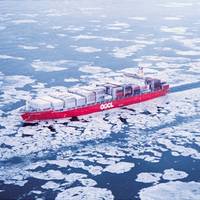CAA Welcomes MSC 's Shelving Arctic Routes
Clean Arctic Alliance has welcome MSC Mediterranean Shipping Company's decision to avoid Arctic shipping route as a new short cut between northern Europe and Asia.Clean Arctic Alliance lead advisor Dr Sian Prior was responding to the announcement that shipping company MSC “will not explore or use the Northern Sea Route between Europe and Asia for container shipping” and that it believes that shipping lines should focus on reducing the environmental impact of existing shipping trade routes”.“The Clean Arctic Alliance welcomes MSC’s decision to avoid using the Northern Sea Route to ship goods between Asia and Europe. While MSC have understandably come under fire for their environmental record elsewhere…
Ocean Conservancy Calls for Clean Arctic
“Ocean Conservancy welcomes steps taken by the International Maritime Organization to mitigate risks to the Arctic from the use and carriage of the world’s dirtiest fossil fuel. “Support for Measures to Reduce Risks of Use and Carriage of Heavy Fuel Oil as Fuel by Ships in Arctic Waters marks an important milestone in the bid to phase out the use of heavy fuel oil in the Arctic. “With climate change impacts resulting in record-breaking loss of sea ice—winter ice in the Arctic hit a record setting low in 2017 since records began 38 years ago—there will be a dramatic increase in vessel traffic through shorter Arctic sea routes to transport cargo between Southeast Asia and Europe. At present, around 75% of marine fuel currently carried in the Arctic is heavy fuel oil.
Clean Arctic Alliance Praises Move to Phase out HFO Use
Responding to the December 20th joint statement from the United States and Canada, regarding development of a strategy to phase out their use of heavy fuel oil (HFO) from vessels operating in the Arctic, the Clean Arctic Alliance praised both Arctic nations for their ambitious action to rid the region of the dirtiest marine fuel. “The Clean Arctic Alliance applauds the commitment of President Obama and Prime Minister Trudeau to develop a concrete proposal to phase down HFO use in the Arctic”, said Clean Arctic Alliance advisor Dr Sian Prior. The US and Canada have also agreed to propose a plan for the next meeting of the International Maritime Organization’s Marine Environment Protection Committee (MEPC 71, July 2017) in order to implement the work necessary for a phase out.
Clean Arctic Alliance Response to Arctic HFO Ban
“The Clean Arctic Alliance welcomes AECO’s reconfirmation of its support for an international ban on heavy fuel oil in Arctic waters. AECO’s decision demonstrates the growing conviction within the shipping industry that the Arctic is simply too vulnerable and too fragile to allow the use of this dirtiest of fuels, and that HFO can no longer be considered an option for powering Arctic shipping in the future”. “By acknowledging the threats posed by spills and black carbon emissions from heavy fuel oil, the Arctic cruise industry has recognised that while it expands, it must phase out of this dirty fuel in order to protect the environment and human health, and safeguard coastal communities and food security”, continued Prior.
IMO Moves toward Phase out of HFO in the Arctic
The International Maritime Organization’s (IMO) Marine Environment Protection Committee (MEPC70) meeting brought progress by member countries toward a phase out of the use of heavy fuel oil (HFO) by vessels operating in the Arctic. Heavy fuel oil (HFO) breaks down extremely slowly in cold Arctic waters and is very difficult clean up in the event of a spill. While HFO powers some 44 percent of the ships currently operating in the Arctic, it accounts for more than 75 percent of the fuel onboard those ships, according to ICCT figures. HFO is already banned throughout Antarctica and in the national park waters around the Norwegian Arctic archipelago of Svalbard, leaving only a strictly regulated corridor for ships to access the islands.
Heavy Fuel Oil Spill at Port of Long Beach
Approximately 33 gallons of heavy fuel oil was spilled during bunkering operations at an anchorage inside the Port of Long Beach Saturday morning, The U.S. Coast Guard reported. The U.S. Coast Guard, state of California, and response crews are responding. A boom has been set-up to contain the spill and commercial cleaning crews are on-scene. California's Department of Fish and Wildlife, Office of Spill Prevention and Response personnel are on-scene monitoring the operations, as well as Coast Guard pollution responders.
Environmental Groups: IMO Polar Code Too Weak

The International Maritime Organization (IMO) today adopted the Polar Code aimed at regulating shipping in Polar Regions. Several environmental groups have criticized the measures for not going far enough to protect the Arctic and Antarctic environments, arguing that while the new code is a positive step forward, it is insufficient to properly protect Polar environments from the anticipated increased levels of shipping activity. The Polar Code is due to enter into force on January 1…
Olympic Tug & Barge Fined for Port Angeles Oil Spill
The Washington Department of Ecology (Ecology) is fining Olympic Tug & Barge of Seattle $16,500 for spilling oil into Port Angeles Harbor last November. The spill occurred when a company-owned fuel barge was overfilled while being loaded with fuel oil. Ecology determined the Nov. 7, 2012, heavy fuel oil spill occurred because of an error by the barge operator. More than 1,700 gallons of fuel spilled to the deck of the barge with nearly 50 gallons entering Port Angeles Harbor. The oil transfer was being conducted at the Tesoro Port Angeles Terminal located at the foot of the spit Ediz Hook. Olympic Tug & Barge had oil containment boom placed around the barge prior to starting the fuel transfer which helped contain the spill.





